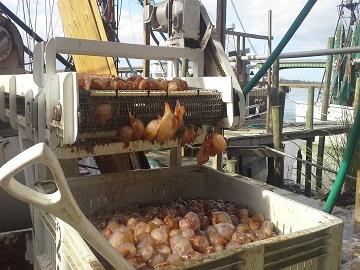
Section Branding
Header Content
Video: Jellyfish Industry Meets Resistance In South Carolina
Primary Content

If you’ve ever been to the beach in Georgia or South Carolina, you’re familiar with the large, round globs called cannonball jellyfish - or jellyballs. You’ve probably also noticed there are a lot of them. That abundance has helped spur an industry in Georgia and Florida for years - catching, processing, and shipping millions of pounds of jellyballs to Asia for food. Now a company in South Carolina wants in on the action. But the jellyball operation is meeting local resistance.
It’s the start of Georgia’s busy season for jellyballs, and boats are already hauling them in. One of Thornell King’s boats is docked in Darien with a big hose stretching out of the hull. It sucks jellyballs out of the boat and spits them onto a conveyor belt, where they land in bins for further processing. It’s a busy operation, and it has to be - each boat brings in 100,000 pounds or more.
Like most boats fishing for jellyballs, King’s crews catch shrimp too. But he estimates jellyballs make up some 70 percent of his business - and that doesn’t just help him. The jellyball operation also creates more jobs. "Well literally, if we were shrimping," he says, "instead of those 150 people up there working, I would need zero of them. I would not need one single one of them."
King says he only needs his boats’ crews of about a half dozen people to unload shrimp. Jellyballs require more hands on deck because the loads are bigger - and they need to be washed, separated, and packaged by hand. The washing is where the trouble starts for a South Carolina jellyball company. The jellyfish produce a substance to defend against predators that has to be rinsed off.
Watch Video: A conveyor belt moves cannonball jellyfish from a boat into bins for washing and processing.
John Cashen lives near Jenkins Creek in Beaufort County, South Carolina. He worries about the runoff from the washing process. "The toxicity has been shown to kill small shrimp and fish," he says.
He’s part of a group of area residents trying to stop jellyball processing in Jenkins Creek. They point to testing done at the request of state regulators that found the runoff exceeds state toxicity limits and will require a permit under federal law.
But the jellyball processor’s environmental consultant Bob Gross says once diluted by the stream the runoff won’t harm Jenkins Creek. "The test results showed that the discharge was toxic in itself," he says. "But animals don’t live in that discharge, they live in the stream."
Gross did the environmental testing for the company that wants to process jellyballs, formerly Carolina Jelly Balls. It’s now called Nautica and Company.
If the South Carolina Department of Health and Environmental Control approves the permit, it will also impose limits on that discharge. Gross says the company will be able to meet whatever the agency requires. "The industry can operate in an environmentally sound, safe, and non-noxious method," he says.
But many in Beaufort County aren’t convinced. The County Council recently voted to impose further zoning restrictions on jellyball processing. The lawyer for Nautica and Company says that only adds red tape for an industry that could save the livelihoods of struggling local shrimpers. But it’s not clear if catching jellyballs would help Beaufort County shrimpers the way it has for their counterparts in Georgia.
Longtime former shrimper Joey Morris manages the Port Royal, South Carolina dock. Morris says it takes a big boat to make money catching jellyballs, which unlike shrimp sell for pennies a pound. He says not many local shrimpers have large enough boats. "These boats that can haul a hundred thousand pounds, they make a little money, they do good," he says. "But there’s no boats around here like that."
Morris says that means even if state and county regulators allow jellyball processing in Jenkins Creek, it won’t be local shrimpers doing business there.
Tags: jellyfish, cannonball jellyfish, jellyballs, shrimping, shrimpers, Beaufort County, Darien, golden dock, jenkins creek, port royal
